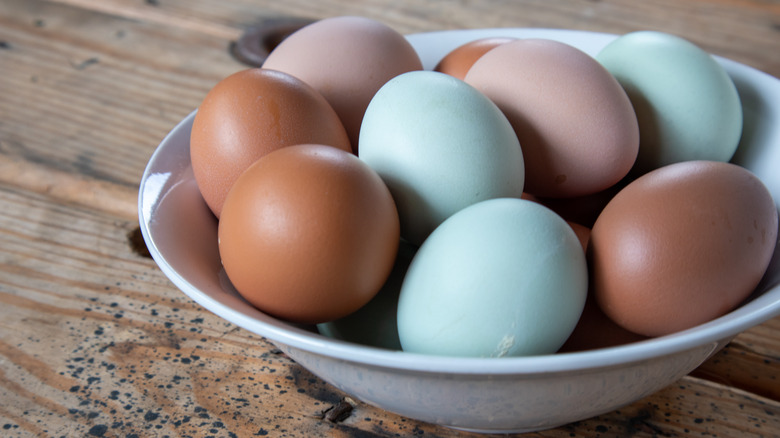What You Don't Know About Blue Eggs
While blue eggs sold in the supermarket may seem like a leftover attempt to capitalize on the passed Easter season, they are more likely to be the product of natural egg laying. At least, by this point.
ABC News explains that the chickens that lay blue eggs do so due to the presence of bilirubin, a chemical compound that some chickens lay on their eggs. Similarly, brown eggs gain their color from added protoporphyrin. However, blue eggs are even more different because the another pigment, oocyanin, which permeates the entire shell, rendering the surface of the egg's interior blue as well.
Animal Hype lists seven breeds of chicken that can lay these blue eggs, though not all have received recognition from either the American Poultry Association or the American Bantam Association. The primary blue egg chicken is the Chilean Araucana. Most of the rest are cross breeds, which include the American Araucana chicken, Easter Eggers, Cream Legbars, Whiting True Blue chickens, and the Arkansas Blue chicken. In China, there is also the Lushi and the Dongxiang chicken of which less is known. Eat This, Not That! cites a study that claims the reason blue eggs in the Americas began in Chile was due to a virus that altered which pigments settled on the eggs.
Blue eggs just taste like eggs
When food is colored, its hue typically affects the way we experience the taste. For example, when the black cheese burger that Burger King offered in Japan appeared in the United States, The Atlantic said that it reminded people of cancerous substances and mold, as we usually associate black food with rot. Fortunately, when it comes to eggs, this is not the case.
Murano Chicken Farms states that regardless of the shell's color, eggs taste like eggs. This includes brown eggs as well, which many customers would swear taste naturally better. The reason brown eggs may taste better is not due to their brown coating, but the fact that brown laying eggs more generally come from chickens that have been raised better. If a regular commercial chicken lived a better life, their eggs would taste better. Moreover, the farm notes, some companies have tried to get on the brown egg bandwagon, but because they have lowered the quality of life for the brown-egg-laying chickens, their eggs taste worse.
So by all means, feel free to purchase blue eggs. But you are unlikely to get anything unique out of them other than saving a few dollars on next year's egg dye.

